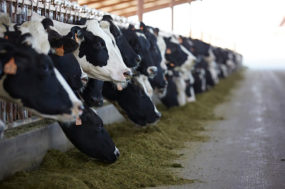Farmers work hard and in challenging conditions. Farming is demanding physically, mentally and emotionally. It requires resilient people, but that resilience can take its toll. Concern over farmers’ mental health has increased in the last few years.
Due to the nature of farming, farmers and their families are susceptible to stress, depression, anxiety and suicide.
We hear the word "mental health" said in many different contexts these days, but what does that mean? The Canadian Center for Occupational Health and Safety describes a state of good mental health as a state of well-being in which a person understands their own abilities, can cope with the normal stresses of life, can work productively and fruitfully, and is able to contribute to their community.
Both physical and mental health are the result of a complex interplay between many individual and environmental factors, including:
- Family history of illness and disease, and genetics
- Lifestyle and health behaviours (e.g., smoking, exercise, substance use)
- Levels of personal and workplace stress
- Exposure to toxins
- Exposure to trauma
- Personal life circumstances and history
- Access to supports (e.g., timely healthcare, social supports)
- Coping skills
When is farmer mental health most at risk?
In the workplace, when the demands placed on someone exceed their resources and coping abilities, their mental health may be negatively affected. The most prevalent risk factors affecting farmers’ mental health include commodity prices, financial difficulties, climate change, drought, hard work, long hours, government regulations, isolation and time pressure. Other factors including pesticide exposure, poor physical health, nutrition, sleep habits and past injuries also play a part in the farmer’s mental health.
Chronic stressors have a major influence on health, both physical and mental. Stress is associated with increased instances of mental disorders including depression, anger, memory loss and anxiety. Some physical symptoms of stress such as stomach issues, headaches and poor sleep also increase the risk of feeling mentally unwell.
The leading causes of disability in Canada are mental illness and substance abuse. There is a stigma around mental illness, so it is important that work be done to remove the stigma and reduce the barriers to seek help when needed.
The link between mental health and workplace safety
When people do not get the support they need to manage their mental health considerations, they become a safety hazard. Mental health considerations can make it difficult to concentrate, prompting you to lose your focus. You may not have the ability to make important decisions quickly. You may feel extremely tired and skip steps or forget to follow proper safety procedures.
You cannot ignore the effect that your mental health has on safety in the workplace.
What can be done to support mental health on the farm?
A psychologically safe and healthy workplace is one that promotes everyone’s mental well-being and does not harm mental health. For example, a psychologically safe workplace would be free of excessive fear or chronic anxiety. One way to achieve a psychologically safe workplace is to create and implement strategies to improve or maintain the quality of working life, health and the well-being of the workforce.
It is also important to get enough sleep, proper nutrition and exercise. The body requires seven to nine hours of sleep per night. Getting a good night's rest is essential to allowing your body to recharge and be ready for the day ahead. Studies have shown that exercise reduces symptoms of depression and anxiety and increases cognitive functioning and self-esteem. Exercising does not have to be an hour-long weightlifting session; it can simply be a walk around your property.
The most important assets on any farm are the people. Farmers are used to managing the health and safety of their farm, but they must also keep in mind the mental health safety of their family, employees and themselves as well. Remember, everyone deals with stress differently. Some people deal with stress head-on while others avoid it at all costs. Farmers must prioritize the mental health of their farm. Farming is demanding on the best of days, and when our mental health isn’t prioritized, simple everyday chores become challenging and stressful tasks.
How can you get help?
Access free, professional mental health counseling support by calling the toll-free number (866) 267-6255.
Designed to help connect Ontario farmers and their families with tailored mental health support offered by licensed professionals, the Farmer Wellness Initiative is available 24 hours a day, seven days a week, 365 days a year, in English and in French.
There are also a number of national crisis line resources available by phone, text and online. For those living outside of Ontario, many provinces have dedicated farmer wellness hotlines and initiatives; a guide to these can be found here.
References omitted but are available upon request by sending an email to the editor.
Strategies to encourage positive mental health in the workplace
- Encourage active employee participation and decision-making.
- Clearly define employees' duties and responsibilities.
- Promote work-life balance.
- Encourage respectful and non-derogatory behaviours.
- Manage workloads.
- Allow continuous learning.
- Have conflict resolution practices in place.
- Recognize employees' contributions effectively.
- Pay attention to each worker’s attitude and how it impacts their job and the other workers around them.
- Encourage socialization outside of work. Having activities and interests outside of work, both with co-workers and with others, can improve a worker's disposition and mental state.
- Do not ignore any warning signs of a mental health concern.
- Keep in mind mental health care and try to fit it into each day. Some things that may be done to decrease stress and improve mental health are scheduling more breaks, allowing extended lunches, having a counselor or therapist number available for your employees if needed, or doing a check-in with each worker before the day starts to see how they are feeling about the upcoming workday.










